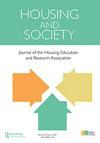Social capital as a predictor of neighborhood satisfaction: an analysis of American Housing Survey national data
Q2 Social Sciences
引用次数: 6
Abstract
ABSTRACT Social capital plays a critical role in neighborhood satisfaction, which in turn contributes to healthy and vibrant communities. However, scholars in housing and community development often leave social capital variables out of analyses. This study uses the American Housing Survey (AHS) 2013 national data, the only AHS data with social capital variables, to measure whether and how social capital dimensions relate to perceived livability of neighborhoods. The research controls for household characteristics, actual and perceived neighborhood and housing attributes, and locational variables. The study uses perceived livability as a proxy to measure the satisfaction levels of residents with their neighborhoods. Overall, citizen participation is weak, while social trust, cohesion, and ties within neighborhoods are strong among the survey respondents. Most of the social capital dimensions are significantly related to perceived neighborhood livability in a positive direction. The results indicate that stronger social capital contributes to higher perceived neighborhood livability. However, the effect of social capital is different among homeowners, renter, urban, and suburban/rural households. Therefore, the important roles of social capital in promoting neighborhood satisfaction and livability require policymakers to pay more attention to social capital factors in neighborhood needs assessment and community development practice.社会资本作为社区满意度的预测因子——对美国住房调查全国数据的分析
摘要社会资本在社区满意度中起着至关重要的作用,而社区满意度又有助于社区的健康和充满活力。然而,住房和社区发展方面的学者经常将社会资本变量排除在分析之外。本研究使用美国住房调查(AHS)2013年的全国数据,这是唯一一个具有社会资本变量的AHS数据,来衡量社会资本维度是否以及如何与社区的宜居性相关。研究控制了家庭特征、实际和感知的社区和住房属性以及位置变量。这项研究使用感知宜居性作为衡量居民对社区满意度的指标。总体而言,受访者的公民参与度较弱,而社区内的社会信任、凝聚力和联系较强。大多数社会资本维度都与感知到的社区宜居性呈正相关。结果表明,更强的社会资本有助于更高的感知社区宜居性。然而,社会资本的作用在房主、租房者、城市和郊区/农村家庭中是不同的。因此,社会资本在促进社区满意度和宜居性方面的重要作用,要求决策者在社区需求评估和社区发展实践中更加关注社会资本因素。
本文章由计算机程序翻译,如有差异,请以英文原文为准。
求助全文
约1分钟内获得全文
求助全文
来源期刊

Housing and Society
Social Sciences-Urban Studies
CiteScore
2.30
自引率
0.00%
发文量
10
期刊介绍:
Housing and Society is the journal of the Housing Education and Research Association (HERA). The journal supports the mission of HERA by providing for the dissemination of research and other scholarly work. Submissions from a broad range of perspectives are encouraged. Topics in housing include: policy, design, social aspects, gerontology, behavioral aspects, energy/environment, equipment, interiors, economics, theory/model development, education, and program development or evaluation. The journal welcomes the submission of original research articles, notes and commentaries. Notes are shorter manuscripts presenting succinct information on housing related to one of the following categories: - Research: exploratory or not heavily theory-based or statistically analyzed - Academic: innovative teaching ideas - Program: development, implementation, and/or evaluation of Cooperative Extension or other housing programming efforts - Policy: examination of policy impact, comparative analysis, and/or need to achieve housing goals - Reviews: books, documentaries, etc.
 求助内容:
求助内容: 应助结果提醒方式:
应助结果提醒方式:


